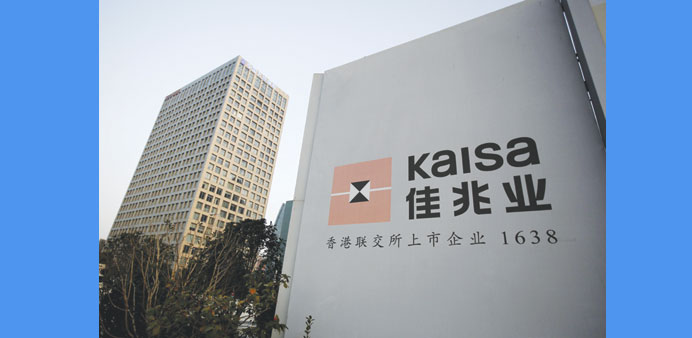A construction site by Kaisa in Shanghai. The developer has offered an additional 50 basis points coupon incentive for all the bonds.
Reuters/Hong Kong
A debt restructuring plan put forward by Chinese developer Kaisa Group has steered away from a doomsday scenario for creditors painted in an earlier report, offering an implied haircut that is severe but not too far off current market prices.
Mired in crisis after the local government in its home base of Shenzhen blocked sales at some of its projects last year, Kaisa needs to get bondholders to agree to its proposals or risk becoming the first Chinese property company to default on offshore debt. Two interest payments are due this month.
Failure to secure an agreement as planned by end March could also scupper its main lifeline - a proposed takeover by rival developer Sunac China Holdings Ltd, which has set a July 31 deadline.
Under Kaisa’s plan for $2.5bn of its offshore and convertible debt, the maturity on six sets of bonds due each year through to 2020 would be extended by five years and coupons would be slashed. There would, however, be no reduction in principal.
For example, $800mn of bonds originally due in 2018 would now be due in 2023 and the coupon would be cut to 5.2% from 8.875%.
“This is potentially a good outcome for the sector,” said Charles Macgregor, Asia head at credit research firm Lucror Analytics. “Indications are that the haircut will be limited to 50% rather than almost 100% as suggested by Deloittes.”
A report by advisory firm Deloitte Touche Tohmatsu, which was hired by Kaisa, concluded that offshore creditors in a liquidation scenario would only receive 2.4% of what they were owed.
“We should not expect more generous terms than this for offshore creditors given that there is no collateral and these bonds are structurally subordinated,” said Eric Liu, investment manager at Aberdeen Asset Management. His fund does not own Kaisa bonds.
Kaisa has also offered an additional 50 basis points coupon incentive for all the bonds if more than half of the holders of its straight bonds and 66% of the holders of its convertible bonds agree to the proposal.
The company said it would propose amendments to its offshore loans, although details were not revealed.
But some fund managers said the proposal was not a best case scenario either and developer’s bonds slipped 4-8 points on Monday. Its shares fell 1.2% to HK$1.61. They have lost 16% since resuming trade in early February after being suspended for more than a month.
China’s government has not explained why sales have been blocked in Shenzhen but the Kaisa case has been linked to the country’s crackdown on corruption, according to newspaper reports.
Liquidity constraints came to the fore when Kaisa missed a deadline for a $26mn coupon payment in January. It narrowly dodged default by making the payment within a 30-day grace period.

